Activist Video Archive, that indispensable repository of Los Angeles’ progressive history, has recently released excerpts from an in-depth interview it conducted with Angela Sanbrano, a key figure in the Latino-rights movement. Sanbrano, who got her first reluctant taste of activism through the United Farm Workers union grape boycott, went on to co-found Inquilinos Unidos, was National Director of the Committee in Solidarity with the People of El Salvador (CISPES) and served as executive director of the Central American Resource Center (CARECEN-LA).
Sanbrano would play a critical role in organizing 2006’s massive immigrant rights march in Los Angeles that protested the criminalization of undocumented immigrants. Today she serves as the executive director of the Mexican Network of Migrant Leaders and Organizations.
» Read more about: Angela Sanbrano: “A Good Organizer Is a Pain in the Butt” »
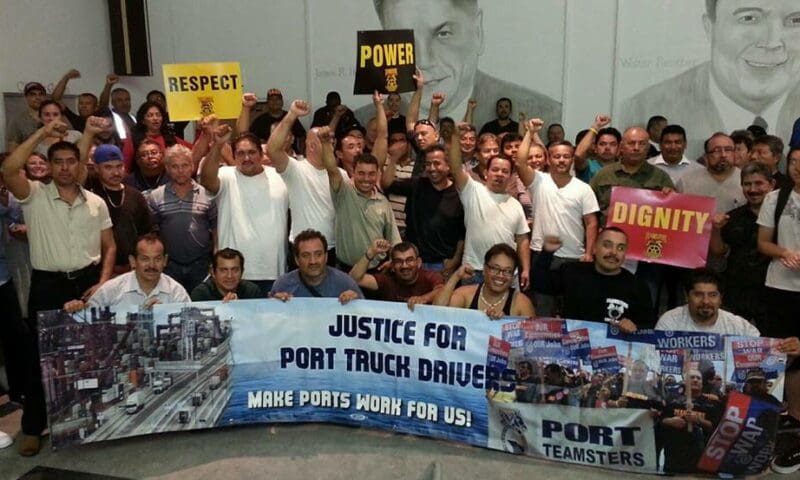
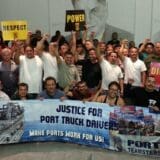
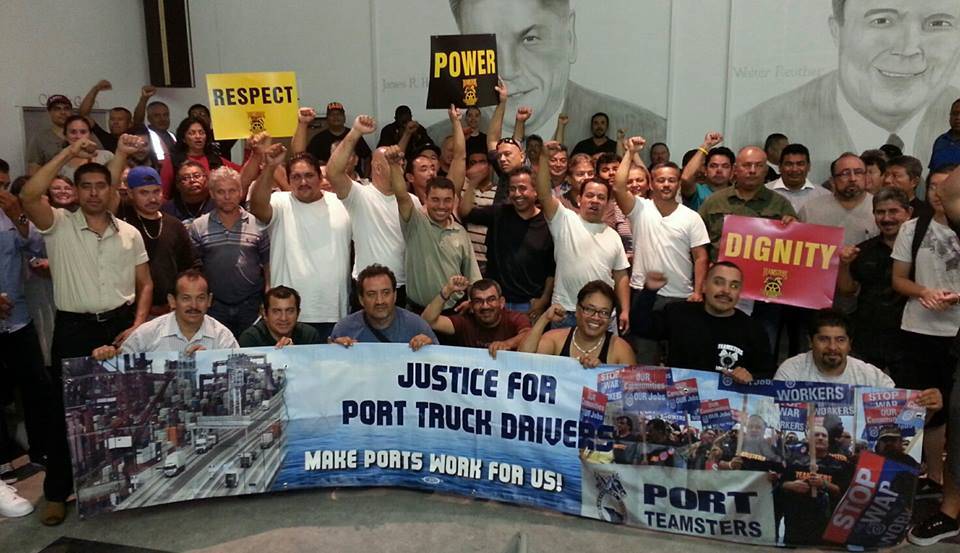
For the fourth time within a year, truck drivers at the ports of Los Angeles and Long Beach have gone on strike. The drivers allege that two hauling companies, Total Transportation Services Inc. and Pacific 9 Transportation, have been retaliating against workers challenging their company-defined status as independent contractors, or who have expressed pro-union sympathies. At the heart of the drivers’ complaint is the charge that the two companies have broken the letter and spirit of a cooling-off agreement brokered by Los Angeles Mayor Eric Garcetti last July.
That agreement, which called on trucking companies to take back strikers without retaliating against them, had ended a weeklong walkout by the drivers over the issues of job classifications and working conditions.
At a waterfront press conference held today in Wilmington, Teamster union activist Alex Paz told listeners, “We are fed up with the injustices committed by companies that haven’t gotten the message yet” about the need to honor the cooling-off agreement.
» Read more about: Port Truck Drivers Strike Over Company Retaliations »



Wage theft is a serious yet seldom-reported crime that victimizes millions of Americans – particularly low-income and immigrant workers. Today, as part of an ongoing examination of workplace issues, Capital & Main debuts a new series focusing on wage theft, beginning with a primer on the problem by Bobbi Murray, followed by Joe Rihn’s profile of a port truck driver who works in an industry where wage theft is a daily fact of life.
The expression “wage theft” is a deceptively gentle term. Perhaps “paycheck mugging” more accurately describes the violence done to the earnings of millions of Americans each year.
If you are a target of wage theft no one pistol-whips you to acquire your valuables–but you definitely get robbed. Every week Los Angeles workers get held up for $26.2 million through unpaid overtime, being pressured to work through unpaid breaks or off the clock;
» Read more about: Wage Theft Confidential: How Your Earnings Are Stolen »


For Victor Vitela life revolves around work. A reserved man with dark hair and a powerful frame, Victor makes his living driving an 18-wheeler loaded with cargo back and forth from the ports of Long Beach and Los Angeles to the Inland Empire. His tone is matter of fact when he talks about his job with QTS Inc., a Gardena-based hauling firm. Victor often works late, until three or four in the morning, leaving just enough time to catch a few hours of sleep before the day begins again at 7 a.m. In his line of work, 20-hour days are the norm. That doesn’t leave enough time to return to his family in Ventura County, so he spends Monday through Friday living out of his truck.
Victor may spend a huge amount of time working for QTS, but you wouldn’t know it from his paycheck, which is eaten up by the kind of expenses and deductions many employers would be expected to pay – the insurance on his truck,
» Read more about: Wage Theft Confidential: A Truck Driver’s Story »
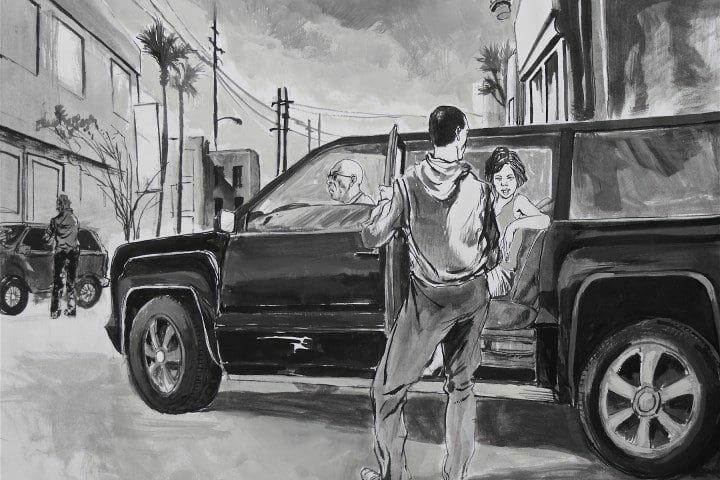

“Hello again,” a familiar female said to Little Joe, who stood ready for flight or fight on the sidewalk. The woman who spoke leaned out of the Escalade’s open rear door. The pearl black vehicle had stopped near him on the street.
He frowned, recognition blossoming. She’d been the one with Teaflake at the burrito joint. He came closer so as to get a better look inside the SUV. “Hello yourself.” There was only her and a bald-headed driver. Well at least it wasn’t Teaflake, he reflected—though it could be one of his enforcers. He remained wary.
“Can I give you a lift?”
“Is this a rubout?” he said, only half-joking.
She laughed heartily. “You’ve been watching too many of those Jimmy Cagney movies.”
The woman was charming and his curiosity was getting the better of his apprehension. What the hell, he concluded. Dressed in slacks and a ribbed top,
» Read more about: The Dixon Family Chronicles: “Esoterica” »


To say that Ed Wytkind likes to talk about America’s epic failure to invest in transportation is akin to saying that Pauline Kael enjoyed critiquing films or that Christopher Hitchens was fond of writing political commentary. Because Wytkind, who heads the AFL-CIO’s Transportation Trades Department and will be honored next month at the L.A. Alliance for a New Economy’s City of Justice Awards, lives and breathes transportation, and is determined to bring the issue front and center in the national conversation.
Wytkind, one of the country’s leading advocates for long-term investment in such things as mass transit and air travel modernization, offers a powerful case that the future of America’s economy is inextricably linked with our decision to either fund or starve our transit systems. And he can be a fierce critic of Congressional inaction on such priorities as full of funding Amtrak and repair of the nation’s neglected highways and bridges.
» Read more about: Trains, Planes and Politics – A Talk With Transportation Advocate Ed Wytkind »
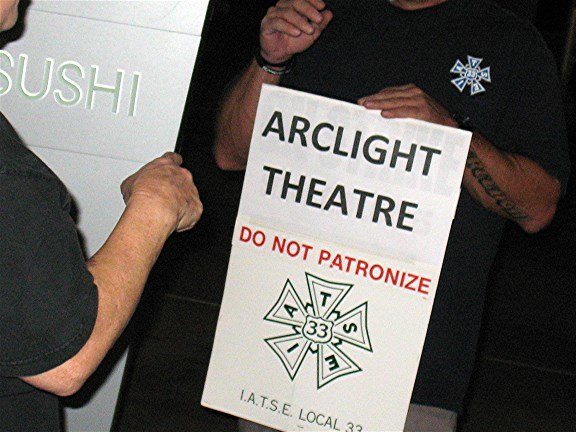


“Shame on Arclight!”
“What do we want? Living wages! When do we want them? Now!”
Last Saturday evening the movie-and-sushi crowd that regularly assembles in the Sunset Boulevard ArcLight Cinema’s courtyard witnessed a spirited protest organized by the International Alliance of Theatrical Stage Employees Union (IATSE) Local 33, on behalf of the projectionists employed by Tinseltown’s priciest movie venue. It was the latest in a series of union actions against ArcLight aimed at drawing public attention to the theater projectionists’ meager wages — under $13 an hour and without health care or pension benefits — nearly half of IATSE’s pay and benefits compensation.
The timing couldn’t have been more annoyingly inopportune for ArcLight. The evening marked the grand opening of the Lionsgate picture Interstellar and, as it turns out, Lionsgate is now busy outsourcing, to overseas, jobs previously held by union musicians.



The Long Beach City Council is set to begin talks on Monday about a Project Labor Agreement that would apply to all city construction projects with a price tag of $125,000 or more. Project Labor Agreements, or PLAs, are “pre-hire” arrangements between unions, government agencies and private contractors who work together on construction projects. PLAs set wages, decide hiring practices and other matters between management and labor, often with the goal of creating community benefits through good jobs. According to a 2001 study on PLAs, prepared for the California State Senate, Project Labor Agreements have existed in California since construction began on the Shasta Dam in 1938, and have been used in both public and private sector projects.
“Project labor agreements are arguably the most important change in labor-management relations in the construction industry in recent years,” the report said.
Typically PLAs ensure that large construction projects pay fair wages,
» Read more about: Long Beach Considers Citywide Project Labor Agreements »


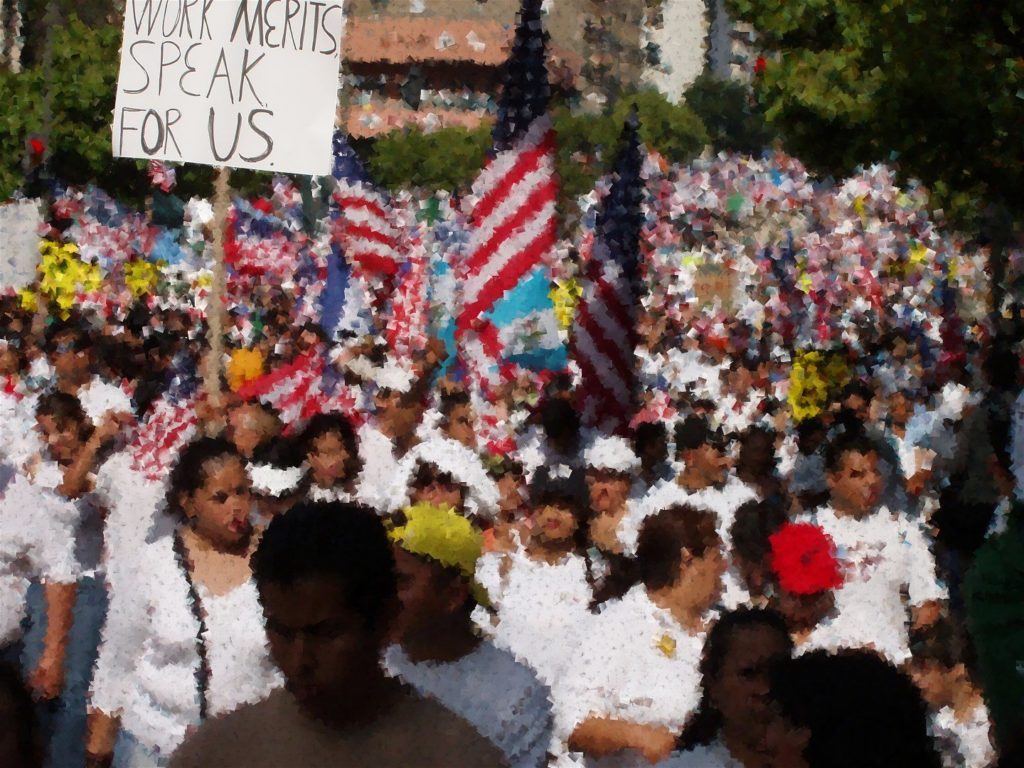
Like most political junkies, I have been so focused on the recent election – national, statewide and local – that I have not been thinking much further. But the vicissitudes of politics always bring me back to the core issues. Once the up and down results are in, I remember again that the electoral process amounts to only a part of what makes a democracy work.
Yes, we must have listening and sympathetic ears among those elected to office. Yes, it helps to have people from the margins brought into the arenas of decision making and sitting in the rooms where deals get made. But without advocates for the issues that matter, however much money gets spent and whoever is elected remains irrelevant.
My loneliest moment as an elected official came about three months into my first term as a member of the Santa Monica City Council. We were deciding on development projects one at a time because we had scrapped the laissez faire rules,
» Read more about: The Heart of the Matter: What Counts After Election Day »
Los Angeles/Long Beach Ports truck drivers Mateo Mares and Amicar Cardona have returned to the jobs they had been fired from– not as misclassified “independent contractors,” but as regular company employees covered by federal labor laws. The men were dismissed by Green Fleet Systems (GFS) last January for disputing their contractor status, for filing state claims for stolen wages and for their open support of the Teamsters union.
In October, after a federal district court had ruled in Mares and Cardona’s favor and ordered the two drivers reinstated, GFS sought an emergency injunction from the U.S. Court of Appeals, Ninth Circuit. The appeals court denied GFS’s request, setting the stage for Mares and Cardona’s triumphant return to work today.
“America’s port drivers are the poster child for wage theft in America,” said Jim Hoffa, Teamsters General President. “Like millions of workers, drivers are treated like regular employees but illegally compensated as independent contractors.
» Read more about: Two Fired Port Truck Drivers Return to Work in Landmark Case »